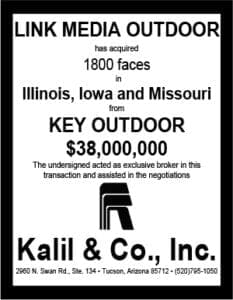
By Kevin Gephart
When you get the feared cancellation call, don’t overreact! Most OOH company’s contracts don’t allow for cancellation. The reality–it is very tough to hold a client to a contract, especially if you want to get paid. Be focused on winning the war not the battle. Take a very customer-focused, empathetic, AND firm approach. It is a tough balance. You can fight to the bloody end yet lose the contract and create long term relationship damage. It would be more strategic to allow a cancelation and negotiate a concrete, specific path to a new contract.
All of your decisions regarding cancellations, have to be done with a keen understanding of the lifetime value of the client. Only concede what is appropriate. If a cancellation is unavoidable, hold the client to a 60-day cancellation window allowing for the resale of the inventory.
Many companies have various departments/budgets. As a “save” measure, suggest that another department make use of the space. It protects their placement and rates for their future use. The HR department may be able to use the space for recruitment, or the Public Affairs/Governmental Affairs/Investor Relations departments may use the program for their initiatives. Company Foundations may use it for public service announcements. Sister companies could make use of the space for their efforts.
Agency cancellations and client-direct cancellations are two very distinct types.
With client-direct, acknowledge their desire to cancel then strategically drill down and determine the precise reason why. Often the reasons can be remedied by you/your company. Anytime there is a new direct client decision maker or new agency you are very vulnerable to a cancellation. Even though you have a contract in place, always resell a new decision maker and/or agency as though it’s a brand-new piece of business.
For an agency cancellation, particularly a new agency, keep in mind agencies are not clients, they are spokespeople for clients. Be sure they are canceling for the client’s reasons and not their own. If they are a new agency on the piece of business, they may want to cancel and replace it which gives them an opportunity to renegotiate rates and prove their worth to the client. They may also be trying to negotiate a media commission for themselves. It is very important to have a direct line to the client to be sure canceling the contract and giving up prime units/placements/rates (they may not be able to get back) is what they want. This is a particular challenge because most local agencies have very little understanding of effective buying/execution of an OOH campaign. Agencies, in order to leverage a cancellation, will always promise more business to come. Document those comments in emails to the agency and follow up diligently to hold them accountable for those promises. Perhaps an agency would replace the business with another of their clients?
Cancellation insurance: Selling is the changing of minds…servicing keeps them changed!
Next week: best ways to compensate sales reps
If you have comments/questions, contact me at: KevinJGephart@gmail.com
[wpforms id=”9787″]
Paid Advertisement


















“Most local agencies have very little understanding of effective buying/execution of an OOH campaign” ouch. Maybe as an industry we should 1. Acknowledge that cancellations happen and write them into our own contracts (like all other mediums do.) 2. Acknowledge that there are MANY agencies who plan and execute OOH effectively ESPECIALLY local ones. These old tropes need to die. Thumbs down to this “hot” more like cold, take.
Including short rate “True up” language as well as 60-day written request requirement language in a cancellation clause works very well in these situations, provided that it’s agreed to by both parties up front. This provides the buyer with the ability to shift ad strategy if necessary, at any time, regardless of the reason, and provides the OOH vendor time to resell the space as well as recover any long-term campaign rate incentives that were given. Too often, both sides dig in and the relationship sours as a result. This option gives both sides a win and leaves the door open for future business.